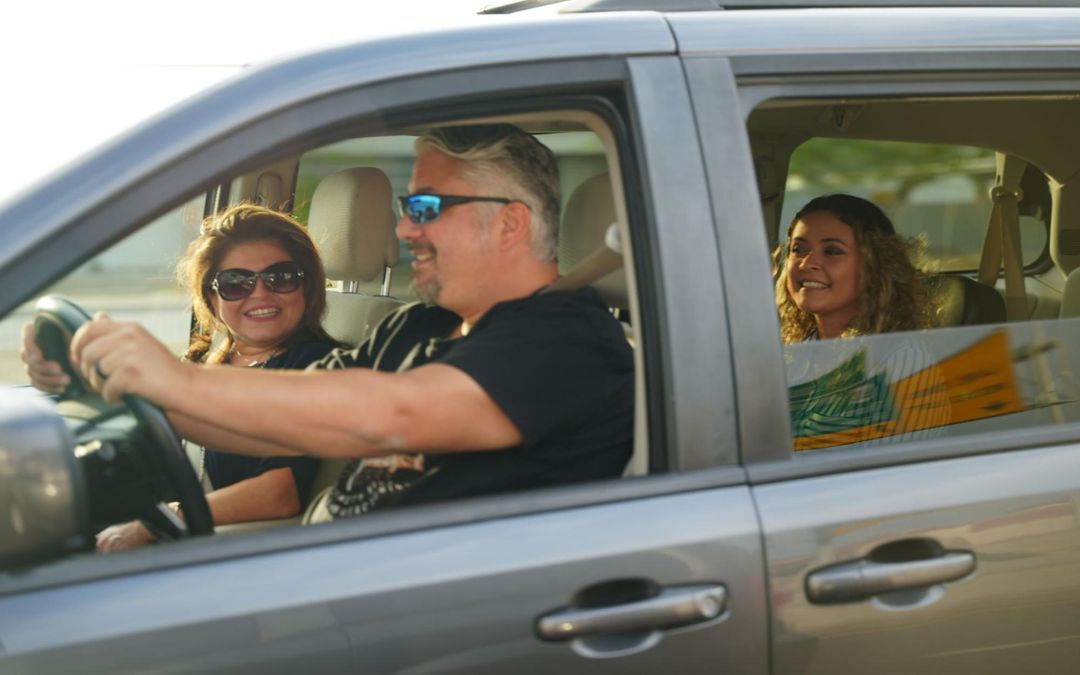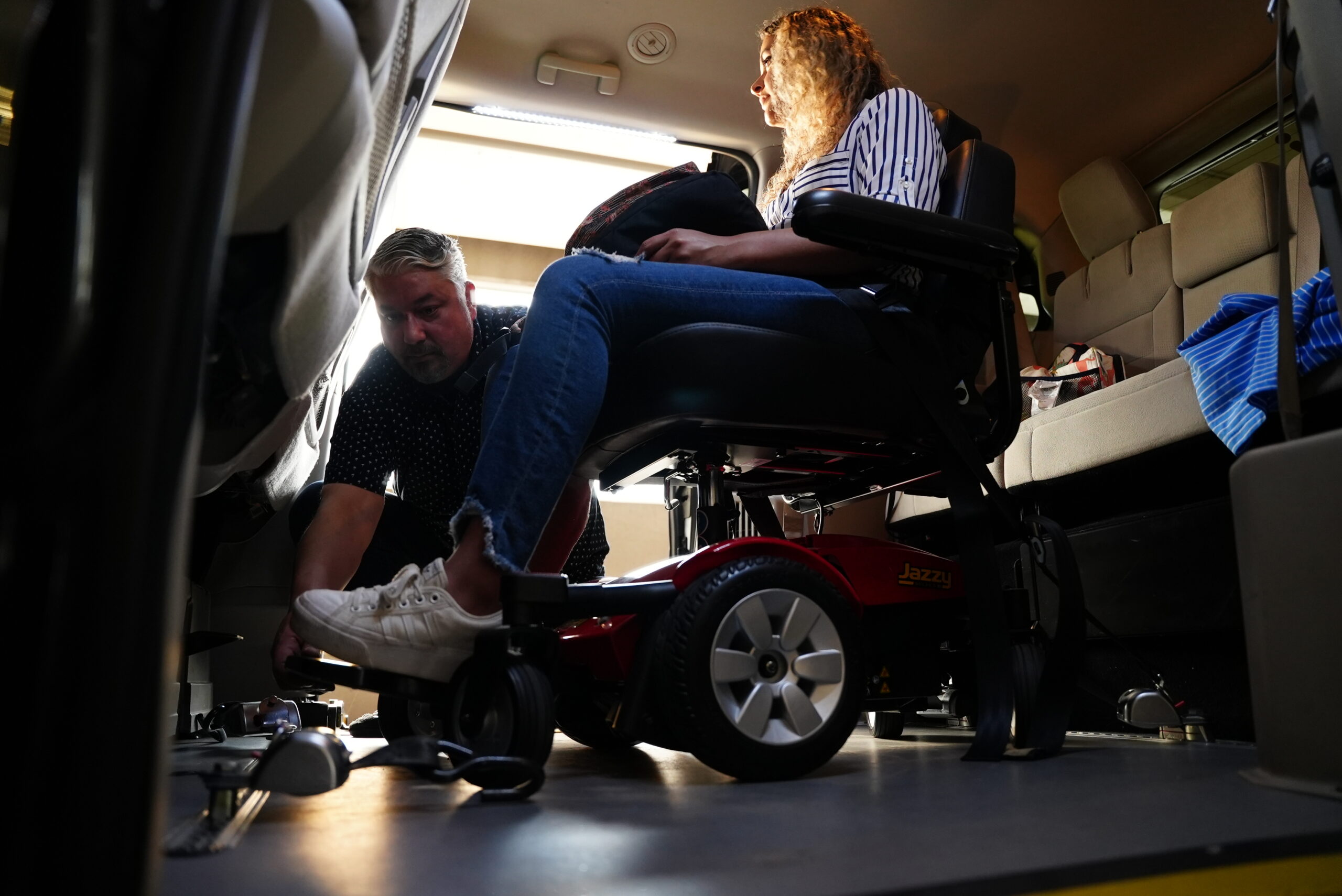If you’re looking for programs to help buy a handicap van, you’re probably familiar with the sticker shock. The cost of buying a new handicap van can be overwhelming – with prices typically ranging from $40,000 to $80,000 depending on the model and modifications. The good news? You don’t have to shoulder this cost alone. There are numerous financial assistance programs designed specifically to help make wheelchair-accessible transportation more affordable.
Whether you’re a veteran with service-connected disabilities, a working professional who needs accessible transportation for your job, or a family seeking more independence for a loved one, there are grants, loans, and reimbursement programs that could significantly reduce your out-of-pocket expenses.
We’ve compiled this guide to the seven most reliable funding sources our customers have successfully used to help purchase their handicap vans. From government programs to nonprofit organizations and manufacturer rebates, these resources can make the difference between wishful thinking and driving home in your own accessible vehicle.
1. Veterans Affairs (VA) Automobile Allowance & Adaptive Equipment Program
If you’re a veteran with service-connected disabilities, the VA offers one of the most substantial financial assistance programs available for purchasing an accessible vehicle. As of 2024, eligible veterans can receive up to $25,603.02 toward the purchase of a wheelchair-accessible van.
Beyond the initial purchase assistance, this program also covers the cost of necessary adaptive equipment, including ramps, lifts, hand controls, and other modifications that make your vehicle accessible for your specific needs.
Who qualifies? Veterans with service-connected disabilities that affect mobility, such as loss or permanent loss of use of one or both feet or hands, or severe burn injuries. Your VA healthcare provider can help determine if you meet the medical criteria.
How to apply: Submit VA Form 21-4502 (Application for Automobile or Other Conveyance and Adaptive Equipment) through the Department of Veterans Affairs. Working with your VA representative can streamline this process and help avoid paperwork delays.
2. State Vocational Rehabilitation (VR) Programs

For many wheelchair users, accessible transportation isn’t just about independence—it’s essential for employment. That’s where State Vocational Rehabilitation programs come in. These state-run agencies provide funding and services to help people with disabilities prepare for, secure, or maintain employment.
If you need a wheelchair-accessible van to get to work or school, your state’s VR program might help cover some of the costs. Funding can be used for vehicle modifications, accessibility features, and in some cases, assistance with the vehicle purchase itself.
Who qualifies? Individuals with disabilities who need accessible transportation to maintain employment or attend educational programs. Each state has its own eligibility requirements, but generally, you’ll need to demonstrate that the van is necessary for your vocational goals.
How to apply: Contact your state’s vocational rehabilitation office to schedule an intake appointment. Your VR counselor will work with you to develop an Individualized Plan for Employment (IPE) that may include transportation assistance.
3. National Organization for Vehicle Accessibility (NOVA) Grants
The National Organization for Vehicle Accessibility (NOVA) provides financial assistance specifically for vehicle modifications through their grant program. If you already have a vehicle that needs to be modified for wheelchair accessibility, or you’re purchasing a new vehicle that requires modifications, NOVA grants can help offset these costs.
Their funding typically covers partial expenses for installing ramps, lifts, hand controls, and other adaptive equipment. While NOVA grants won’t cover the entire cost of a new accessible van, they can significantly reduce your out-of-pocket expenses for necessary modifications.
Who qualifies? Individuals with permanent mobility disabilities who demonstrate financial need. NOVA considers factors such as household income, the cost of the needed modifications, and other funding sources you’ve accessed.
How to apply: Submit an application through the NOVA website. The application process includes providing documentation of your disability, quotes for the vehicle modifications you need, and financial information. Applications are reviewed quarterly, so plan ahead and apply early.
4. The Mobility Reimbursement Program (Offered by Vehicle Manufacturers)
Many major automobile manufacturers offer mobility reimbursement programs to help offset the cost of adaptive equipment. If you purchase a new vehicle and have it modified for wheelchair accessibility within a specified timeframe (typically 6-12 months from purchase), you may qualify for a rebate.
Participating manufacturers include Toyota, Honda, Ford, Chrysler, GM, and many others. Reimbursement amounts vary by manufacturer but typically range from $500 to $1,500.
Who qualifies? Customers who purchase a new vehicle from a participating manufacturer and modify it for wheelchair accessibility within the program’s specified timeframe. You’ll need to work with a certified mobility equipment installer to qualify.
How to apply: After purchasing your vehicle and completing the modifications, submit the required documentation directly to the manufacturer. This typically includes proof of purchase, itemized invoices for the modifications, and documentation of your disability.
5. Private & Nonprofit Grant Programs

Several nonprofit organizations offer grants specifically to help cover the cost of handicap vans and modifications. While competition for these grants can be high, they’re worth exploring as part of your funding strategy.
Some notable organizations include:
- The Bryon Riesch Paralysis Foundation: Provides grants to individuals with neurological disorders for accessibility equipment, including vehicle modifications.
- The Travis Roy Foundation: Offers quality-of-life grants that can help with adaptive equipment and vehicle modifications for those with spinal cord injuries.
- Joni and Friends Wheels for the World: Provides mobility solutions, including assistance with accessible transportation in some cases.
Who qualifies? Eligibility varies by organization, but most focus on individuals with specific disabilities who demonstrate financial need. Many have geographic restrictions or serve specific disability communities.
How to apply: Research each organization’s grant guidelines carefully and submit a complete application according to their requirements. Most nonprofit grants have specific application windows and funding cycles, so timing is important.
6. Medicaid & State Waiver Programs
Depending on your state, Medicaid waiver programs might provide funding for wheelchair-accessible vehicles or modifications. These waiver programs are designed to help people with disabilities live more independently in their communities and often include transportation assistance.
The specific programs and coverage vary significantly by state. Some states might cover vehicle modifications but not the vehicle purchase, while others may provide more comprehensive assistance through consumer-directed waiver programs.
Who qualifies? Medicaid recipients with mobility disabilities who meet their state’s waiver program criteria. Typically, you’ll need to demonstrate medical necessity for the accessible vehicle.
How to apply: Contact your state’s Medicaid office or speak with your Medicaid case manager to learn about waiver programs available in your area. The application process can be complex and time-consuming, so start early and be prepared to advocate for your needs.
7. Buying Previously Owned Accessible Vans from Companies Like Wheelers Van Rentals

One practical way to reduce the cost of a handicap van is to consider purchasing a pre-owned wheelchair-accessible vehicle. At Wheelers Van Rentals, we offer a selection of certified, well-maintained used handicap vans for sale that come with accessibility features already installed.
Our previously owned vans typically cost 30-50% less than new models, making accessible transportation more affordable without sacrificing quality or safety. Because these vehicles have been part of our rental fleet, they’ve been professionally maintained and regularly serviced.
Benefits of buying from Wheelers Van Rentals:
- Significant cost savings compared to new vans
- Accessibility features already professionally installed
- Complete maintenance history and thorough inspection
- Potential for immediate availability (no waiting for custom modifications)
Who qualifies: Anyone looking for a budget-friendly option for purchasing a handicap van. No special eligibility requirements—just a desire to save money on your accessible vehicle purchase.
How to buy: Browse available vans at Wheelers Van Rentals Used Vans for Sale and contact us for pricing and details. We can work with you to find a van that meets your specific needs and budget.
Find the Right Program to Fund Your Handicap Van
Navigating the various funding options for wheelchair-accessible vehicles can feel overwhelming, but you don’t have to figure it out alone. Many of our customers successfully combine multiple funding sources to make their handicap van purchase affordable.
For example, a veteran might use their VA automobile allowance, a manufacturer rebate, and purchase a pre-owned van to maximize their savings. A working professional might combine vocational rehabilitation funding with a nonprofit grant to cover their accessible transportation needs.
The key is to start your research early, apply to multiple programs, and be persistent. Funding timelines rarely align perfectly with your need for a vehicle, so planning ahead gives you the best chance of securing the assistance you need.
Need help finding the right accessible van or understanding your funding options? Our team at Wheelers Accessible Van Rentals has helped thousands of customers navigate this process. We’re happy to share our experience and connect you with resources that might help make your handicap van more affordable. Click here to contact us.

